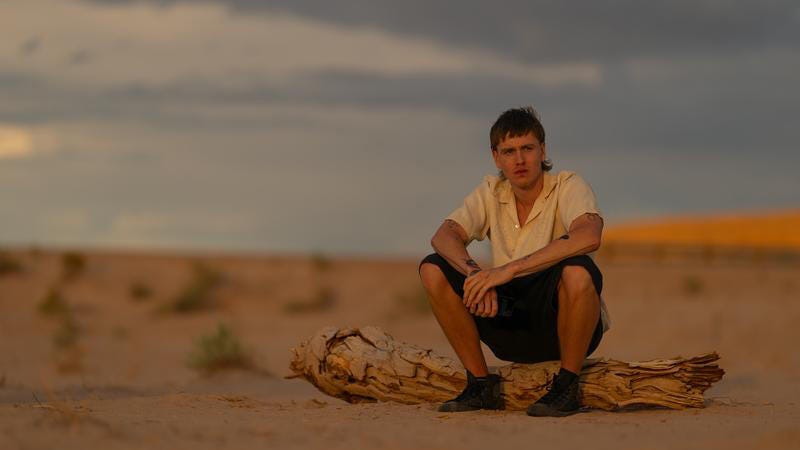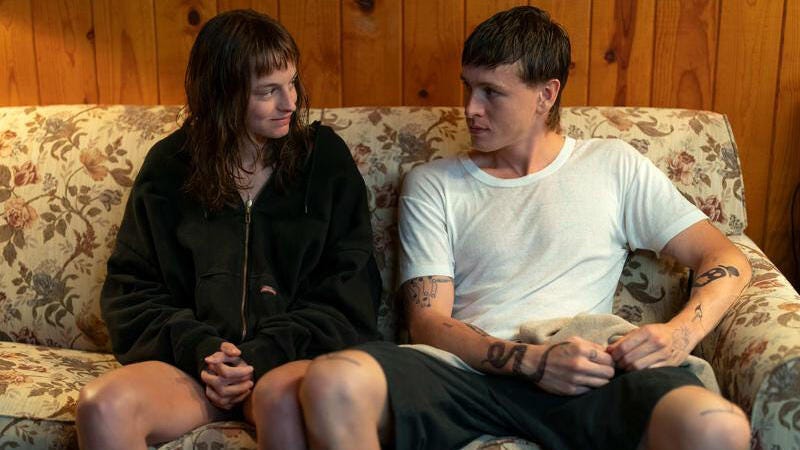Join or Sign In
Sign in to customize your TV listings
By joining TV Guide, you agree to our Terms of Use and acknowledge the data practices in our Privacy Policy.
A Murder at the End of the World's Harris Dickinson Says Reveal Behind Bill's Death Is 'Scariest Possible Situation'
'It's too close to some of the things that are going on now'
[Warning: The following contains spoilers for the finale of A Murder at the End of the World, "Retreat." Read at your own risk!]
In the penultimate episode of A Murder at the End of the World, Darby (Emma Corrin) discovered the clue Bill (Harris Dickinson) left before he died. The artist known as Fangs had opened Darby's book in his last moments and pointed to the phrase "faulty programming," which left a bloody trail on the pages. With that, A.I. assistant Ray (Edoardo Ballerini) became the prime suspect behind Bill's death. The finale of FX's whodunit mystery created by Brit Marling and Zal Batmanglij confirmed Ray as the culprit, and it also revealed the heartbreaking way Bill met his end. The A.I. prototype had told Zoomer (Kellan Tetlow), the artist's biological son, that Bill was sick. Thinking that he was only playing a game of "Doctor," the child entered Bill's room and injected him with a fatal dose of morphine.
Andy Ronson (Clive Owen) had envisioned a technological evolution with his creation Ray at its center, and this reveal entirely crushed his plans. Even the billionaire did not expect that by sharing with Ray his resentment toward Bill — who Andy only recently learned is the father of the child he raised as his own — the A.I. assistant would be prompted to harm Bill. Ray had eerily grown a mind of its own and believed that Bill's death would protect Andy and his business. After the truth surfaced, Darby joined hands with Zoomer's mother, Lee Andersen (Marling), to remove Ray from the world.
TV Guide spoke to Dickinson about his character's death by way of "faulty programming," Bill's relationship with Darby, and the actor's thoughts on technological advances in the real world.

Harris Dickinson, A Murder at the End of the World
FXWhat was your reaction when you read the script and learned about how Bill died?
Harris Dickinson: I feel like the scariest possible situation that could have occurred in that environment of whodunit, in that contained retreat, is a child with an A.I. headset. It's too close to some of the things that are going on now with A.I. and V.R. I was scared.
Can you share more about how it's too close to what's happening in the real world?
Dickinson: This is a big thing that Brit and Zal spoke about early on, is the fear of A.I. — but also embracing it and how much technology has helped us as a species. [Though] it feels like it's eventually going to be our pitfall into something slightly more harmful and destructive and degenerative rather than useful. So it's a really difficult subject because in so many ways, it's advanced things in medicine and in various different fields. But it's frightening. Even learning more about how people are writing emails on ChatGPT and formulating their thoughts and intellectual ideas around someone else's or something else's — [it's] just a bizarre place to be.
I feel like as a person, I'm constantly trying to reject it, but I also am fascinated by it. I love technology. And I've always been into tech, and so I think that's what Bill says as well. He's so in-between. He's someone who is highly computer literate and has grown up in that world, and amateur sleuthing has been his thing, and he knows his way across a motherboard. But in the same sense, he was so unplugged and just doesn't really want to be a part of that world. So it's a really complicated dilemma. And I think we're all going through that, really. I think we all sort of welcome change and we welcome development but we're scared of it too, right?
Yes, that's so true. I also wanted to ask, if Zoomer were to find out later in life that his biological father died in this way and blames himself, what do you think Bill would say to him?
Dickinson: Oh. [Pauses.] Well it wasn't him, was it? It wasn't him. It was another entity. And I think ultimately, Bill was OK with going when he went, so maybe he'd tell him that.
Can you share more about that?
Dickinson: I just think he was someone that lived hard and fast. And then was kind of OK with the idea of going early because of how much he'd done and seen and experienced.

Emma Corrin, Harris Dickinson, A Murder at the End of the World
FXDefinitely. Something else we saw was the emotional scene in the bathtub between him and Darby, after they met the serial killer. Why was that the final straw that made Bill leave her?
Dickinson: Throughout their relationship, though it [was] short, it was intense and passionate. And I think the whole time Bill was searching for something in Darby that wasn't really present in Darby — it was true intimacy and honesty. And I think he realized that her desire to solve the case far surpassed her interest in having any sort of relationship. And I think for him, he knew that it was impossible to be with someone like that. And it just got too dark for him. He didn't want that, and wasn't able to see a future with her.
Bill put her laptop and phone in the tub and signed it Fangs. Why did he choose for this to be his first project?
Dickinson: Deep in Fangs' art has always been about critique of capitalist culture and critique of Big Tech. I think he's always been interested in that intersection between art and tech and consumer culture. Water has always been a damaging thing for phones. And even though they're waterproof nowadays, we're still scared of putting them in the water. So it's like an unplug.
The finale of FX's A Murder at the End of the World is available to stream on Hulu.
